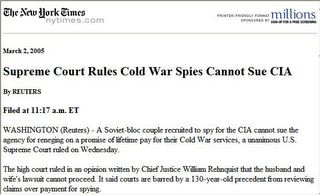
Filed at 11:17 a.m. ET WASHINGTON (Reuters) - A Soviet-bloc couple recruited to spy for the CIA cannot sue the agency for reneging on a promise of lifetime pay for their Cold War services, a unanimous U.S. Supreme Court ruled on Wednesday. The high court ruled in an opinion written by Chief Justice William Rehnquist that the husband and wife's lawsuit cannot proceed. It said courts are barred by a 130-year-old precedent from reviewing claims over payment for spying. The Supreme Court cited as the basis for its ruling its 1875 decision that the heirs of William Lloyd could not sue to recover money promised by President Abraham Lincoln in 1861 for spying on Confederate troops during the Civil War. ``The possibility that a suit may proceed and an espionage relationship may be revealed ... is unacceptable,'' Rehnquist wrote in the 10-page opinion. ``Forcing the government to litigate these claims would also make it vulnerable to 'graymail,' i.e., individual lawsuits brought to induce the CIA to settle a case (or prevent its filing) out of fear that any effort to litigate the action would reveal classified information that may undermine ongoing covert operations,'' he said. The ruling was a defeat for the couple who have been identified only by the pseudonyms John and Jane Doe. Former citizens of a Soviet-bloc nation, they defected to the United States and became U.S. citizens. The couple said the CIA recruited them during the Cold War to spy after they expressed interest in defecting to the United States. The husband was a high-ranking diplomat. They said they had been assured that if they spied the CIA would arrange for their eventual resettlement in the United States and ensure their financial and personal security for life. They said they carried out their end of the bargain, but the CIA reneged and abandoned them. After the couple came to the United States, they eventually resettled in the Seattle area. Beginning in 1987, the husband got a job with the assistance of the CIA, which gave him a false resume and references. The couple received as much as $27,000 a year from the CIA until the husband began earning more than that in his job. But he lost his job at a bank in 1997 as a result of a corporate merger. The couple said the CIA told them that they had already been paid enough for their services and further support would not be provided. Their lawsuit sought a court order that the CIA pay them financial support, pending review of their case by the agency. A federal judge and then a U.S. appeals court based in San Francisco ruled their lawsuit could go forward. But the Supreme Court said the appeals court was wrong in holding that the its 1875 decision does not require dismissal of the couple's claims. Rehnquist said that in the case of a former spy, the core concern of the 1875 decision -- preventing the disclosure of the spy's secret relationship with the government -- applies. The 1875 ruling held the president had the power to bind the United States to contracts with secret agents, and that allowing a former spy to bring a lawsuit to enforce the terms of the contract would be incompatible with its secret nature. Rehnquist rejected the argument that the case could proceed with other protections to ensure classified information is not disclosed. Copyright 2005 Reuters Ltd.
No comments:
Post a Comment